Introduction: What Is the Key to Happiness and Peace?
Every day, we wake up to news of chaos—wars, inflation, political divides, and social injustices. The truth is, life isn’t fair.
The systems in place often benefit only a select few, leaving many of us feeling overwhelmed and powerless.
So, how do we cut through the noise and cultivate a peaceful life in this chaotic world?
From my experience of surviving narcissistic relationships, engaging in deep healing, and committing to therapy, I’ve come to understand that a truly happy and peaceful life boils down to three core areas:
- Understanding yourself
- Understanding the society and systems around you
- Understanding relationships
Stick with me, and by the end of this post, you’ll have practical steps to create your own version of peace and happiness, without relying on toxic positivity or unrealistic advice.
1. Understanding Yourself: The Foundation for a Peaceful Life
You can’t live a peaceful life if you’re constantly at war with yourself. But the path to understanding who you really are isn’t always simple or comfortable.
Many of us go through life asking, Why am I the way I am? The journey to self-awareness can feel like opening Pandora’s box—difficult, messy, and emotional. However, it’s the first step toward building a peaceful life.
Trying to Understand Why You Are the Way You Are
The hardest part of creating a peaceful life is figuring out what’s going on inside your own head.
To understand why you are the way you are, cultivating self-awareness is essential.
This process involves introspection and reflection, allowing you to explore your thoughts, feelings, and behaviors.
Understanding yourself may require revisiting painful experiences and past traumas.
Healing from trauma or abuse isn’t linear, and it’s completely normal to feel like you’re taking two steps forward and one step back.
Here are a few resources for self-awareness:
The iNLP Center offers a research-based assessment with 12 multiple-choice questions that will tell you the level of your self-awareness and what you can do to improve it.
Personality Disorders and Neurodivergence
It’s important to explore potential mental health diagnoses that might impact your sense of self and inner peace.
These could include:
ADHD, Autism Spectrum Disorder, or other forms of neurodivergence
Personality disorders like Borderline Personality Disorder (BPD)
Anxiety, depression, or other mental illnesses that affect daily functioning
When we don’t know what we’re dealing with, it’s easy to feel stuck or broken.
But understanding your brain’s unique wiring can be a powerful tool for creating a peaceful life.
Here are a few resources for Neurodivergence Diagnosis:
https://aimforward.co.uk/online-tests/neurodiversity-test/
https://exceptionalindividuals.com/candidates/neurodiversity-resources/neurodiversity-quizzes/
https://psychcentral.com/quizzes/neurodivergent-test
Self-Doubt and Belief Systems That Hold You Back
Beyond diagnoses, many people struggle with self-esteem issues and negative belief systems that they’ve carried for years.
These beliefs are often internalized from childhood or toxic relationships.
Ask yourself:
-
Do I trust myself to make good decisions?
-
Am I constantly doubting my worth?
-
What stories do I tell myself about who I am?
Recognizing these patterns is essential for building a peaceful life. You can’t fix what you don’t acknowledge.
The following infographic from PsychologyTherapy is about layers of a person’s belief system.
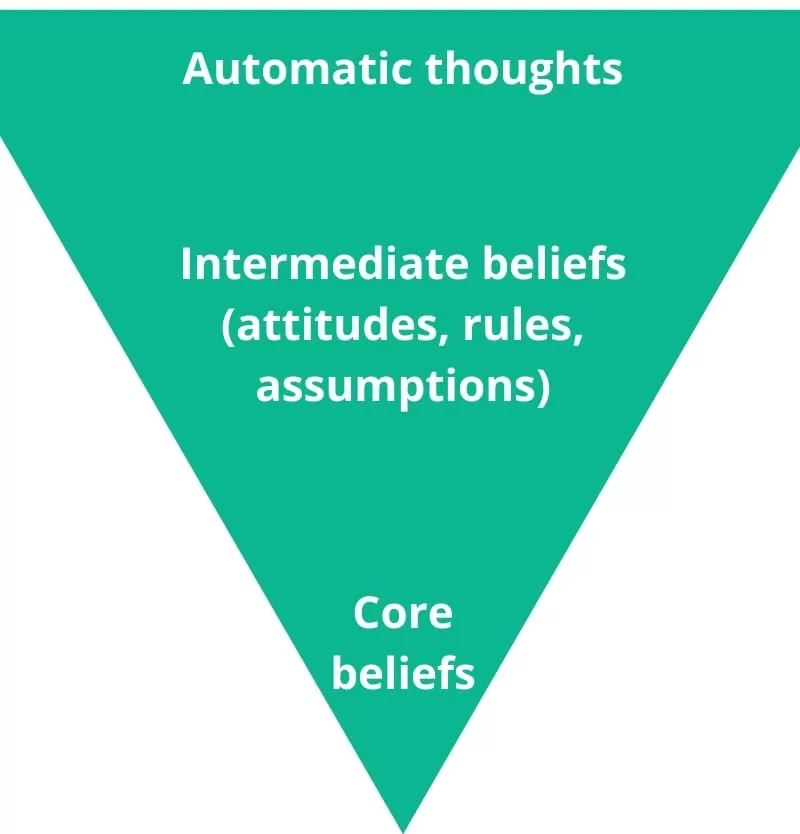
Understanding Your Core
Trying to understand your core
- Wounds
- Fears
- Beliefs
- Vulnerabilities
- Values
- Hopes
- Needs
Actionable Steps to Understand Yourself and Create a Peaceful Life
Here are a few steps to get started on the journey to self-awareness:
Journal Your Thoughts: Writing things down can help you process emotions and identify patterns.
Seek Therapy/Healing: A therapist/coach can help you navigate trauma, mental health diagnoses, and self-esteem issues.
Explore Your Neurodivergence: If you suspect you may be neurodivergent, don’t hesitate to pursue a diagnosis. It can be life-changing.
Pro Tip: Self-awareness isn’t a one-and-done process. It’s ongoing, and that’s okay. Give yourself grace as you grow.
2. Understanding Society and Systems Around You: Building Awareness for a Peaceful Life
A peaceful life isn’t just about understanding yourself; it’s also about making sense of the systems that shape your experiences.
The world is full of structures that often work against individual peace.
Most systems around us are primarily built for neurotypical white males.
Even if you are a white male, these systems often prioritize the convenience of the extremely wealthy, leaving others to navigate systemic challenges.
To achieve a peaceful life, it’s crucial to understand the forces at play in society.
Systems like capitalism, patriarchy, organized religion, and even pop culture all influence how we live, think, and make decisions.
Capitalism
This economic system often prioritizes profit over people, creating inequities that can feel impossible to overcome.
Understanding its mechanics can help you make better financial and life decisions.
The following infographics from Climateandcapitalism show wealth distribution in the world.
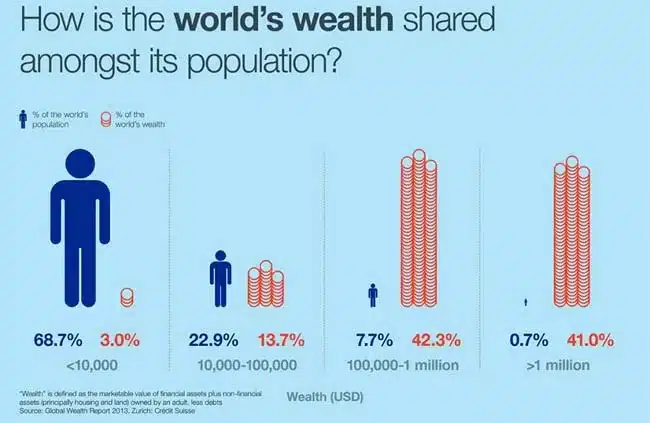
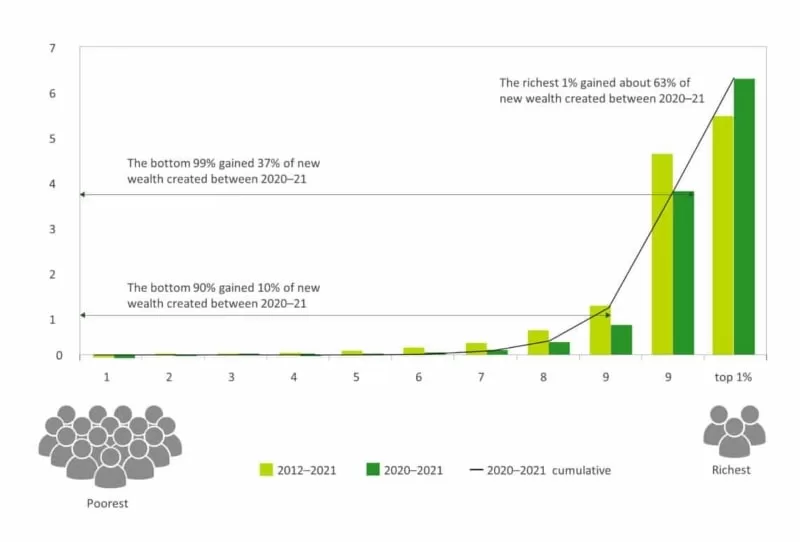
A new analysis by the Fight Inequality Alliance, Institute for Policy Studies, Oxfam, and the Patriotic Millionaires reveals that implementing an annual wealth tax of up to 5% on the world’s multi-millionaires and billionaires could generate $1.7 trillion annually.
According to a new Oxfam report,
- Billionaire wealth has risen three times faster in 2024 than in 2023.
- Most billionaire wealth is taken, not earned – 60% comes from either inheritance, cronyism and corruption or monopoly power.
- At least five trillionaires are now expected within a decade.
Practical Ways to Resist Capitalism in Daily Life
By fostering local economies, supporting ethical businesses, and advocating for systemic reforms, individuals can create a more sustainable and equitable economic landscape
Conscious Consumption: Be mindful of your purchases by following the principles of the 5 R’s: Refuse, Reduce, Repair, Reuse, and Recycle. This challenges the disposable culture and encourages sustainable practices
Grow Your Own Food: Cultivating your own food reduces reliance on industrial agriculture and supports local economies. If growing your own food isn’t feasible, consider buying from local farmers instead of large supermarkets
Embrace Minimalism: Adopt a lifestyle that prioritizes needs over wants, reducing material consumption and focusing on experiences rather than possessions
Educate Yourself: Understanding capitalism’s mechanisms and exploring alternative economic systems is crucial. Engage with literature and discussions that address these topics to become more informed
Here are a few more resources on how to resist capitalism:
https://www.dns-tvind.dk/fightingcapitalism/
https://truthout.org/articles/ten-ways-to-challenge-capitalism-s-death-grip-on-daily-life/
Patriarchy
Patriarchy is a social system characterized by the dominance of men in positions of authority across various spheres, including political, economic, and familial structures.
A system that privileges men—and often harms them, too. Recognizing its impact can help you decenter men in your life and challenge limiting gender norms.
Decentering Men: A Key to Dismantling Patriarchy
For many, achieving a peaceful life involves challenging traditional gender roles and expectations.
Decentering men doesn’t mean rejecting relationships with men; it means placing your own needs, goals, and happiness at the forefront.
Ask yourself:
Am I making decisions based on what I want or what others expect of me?
Do societal expectations dictate how I view myself?
By recognizing and rejecting these pressures, you can create a life that aligns with your authentic self.
Resisting patriarchy is a multifaceted endeavor that requires systemic change, individual introspection, and collective action.
The most effective tool that you can use in your daily life is to decenter men and reject “pick-me” women.
Here are our blog articles on how to decenter men:
https://ungaslited.com/decentering-men-10-strategies/
https://ungaslited.com/decentering-men-lorraine-lyon-fargo-season-5/
https://ungaslited.com/10-ways-of-decentering-men-in-your-work-environment/
https://ungaslited.com/10-strategies-to-decenter-men-in-your-personal-life/
Religion
Religion has historically played a significant role in shaping individual and societal behaviors through various control mechanisms.
- Religious teachings often provide a moral compass that defines acceptable behavior within a community.
- In many societies, religious principles serve as the moral basis for laws and policies.
For example, Islamic law (Sharia) governs various aspects of life in Muslim-majority countries, while Judeo-Christian ethics have shaped legal systems in many Western nations, impacting concepts like human rights and equality.
- Religious teachings often reinforce traditional gender roles, affecting family dynamics and societal expectations. Most religions are sexist and designed to favor men. They also exclude LGBTQIA+ communities.
- Many religious teachings instill a sense of fear regarding sin and punishment.
This fear can inhibit personal growth and spontaneity, leading to a life dominated by guilt and self-loathing.
- Religion often promotes the idea that individuals are inherently sinful or flawed.
This belief can result in significant self-hatred and mental distress when followers fail to meet religious standards of perfection
- Inflexible thinking patterns
This rigidity may discourage personal autonomy and critical thinking, making it difficult for individuals to seek help or question harmful practices
- Intolerance and Conflict
Religion can exacerbate social divisions, fostering an “us vs. them” mentality.
- Violence and Terrorism
Religious beliefs have been linked to various forms of violence, including honor killings and terrorism.
You can read more about the influence of religion on society here:
https://sofoarchon.com/the-negative-effects-of-religion-on-society/
https://www.psychiatrictimes.com/view/religion-spirituality-and-mental-health
People, especially women—often viewed by some religions as mere baby-making machines—should consider distancing themselves from these systems and refrain from supporting them with their time, energy, or effort.

Afghan women hold placards as they protest for their right to education, in Mazar-e Sharif on 12 August 2023. Photo by Atef Aryan/AFP.
Books to Read About Social Systems:
The Social System by Talcott Parsons
Systems Thinking for Social Change by David Peter Stroh
The Sociological Imagination by C. Wright Mills
Mind, Self, and Society by George Herbert Mead
3. Understanding Relationships: Building Healthy Connections for a Peaceful Life
Relationships are the foundation of a peaceful life, but they can also be the source of immense stress. Learning to navigate them wisely is key.
Family of Origin and Attachment Styles
Our families shape how we see ourselves and interact with others. Recognizing these patterns can help you:
-
Understand your triggers
-
Build healthier boundaries
-
Heal old wounds
Attachment styles—secure, anxious, avoidant, or disorganized—can affect your ability to form healthy, fulfilling relationships.
Understanding yours is a crucial step toward creating a peaceful life.
The following infographic from Simplypsychology is about different Attachment Styles.
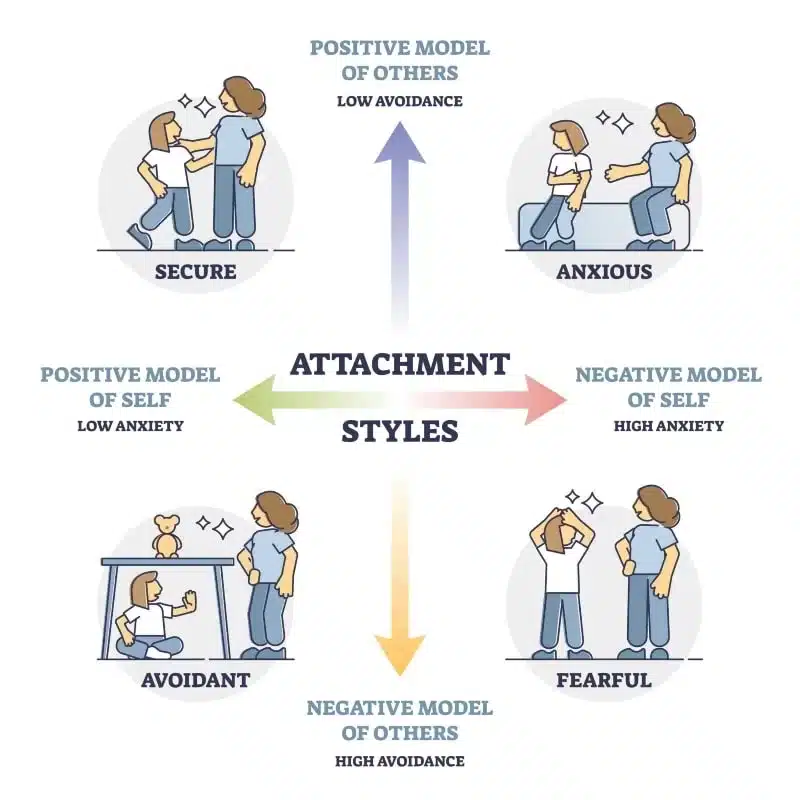
Dealing with Narcissistic People
“If you understand narcissism, you understand mental health”
-Ramani Durvasula
One of the most important life skills you can develop is learning how to deal with narcissistic people.
Conventional relationship advice won’t work in case of narcissistic relationships.
- Recognize Manipulative Behavior. Gaslighting, love-bombing, and other tactics are common.
- Set Firm Boundaries. Be clear about what you will and won’t tolerate.
- Limit Contact When Necessary. Protect your peace by minimizing interactions with toxic people.
Here are our blog articles on how to deal with narcissists:
https://ungaslited.com/going-no-contact-10-strategies/
https://ungaslited.com/5-tips-to-deal-with-narcissists-in-extended-family/
Setting boundaries
Setting boundaries is a fundamental aspect of maintaining healthy interpersonal relationships.
Boundaries define the limits we establish regarding how we interact with others, ensuring that our emotional, physical, and psychological needs are respected.
The following infographic from Lifecoachhub explains the 7 types of boundaries.
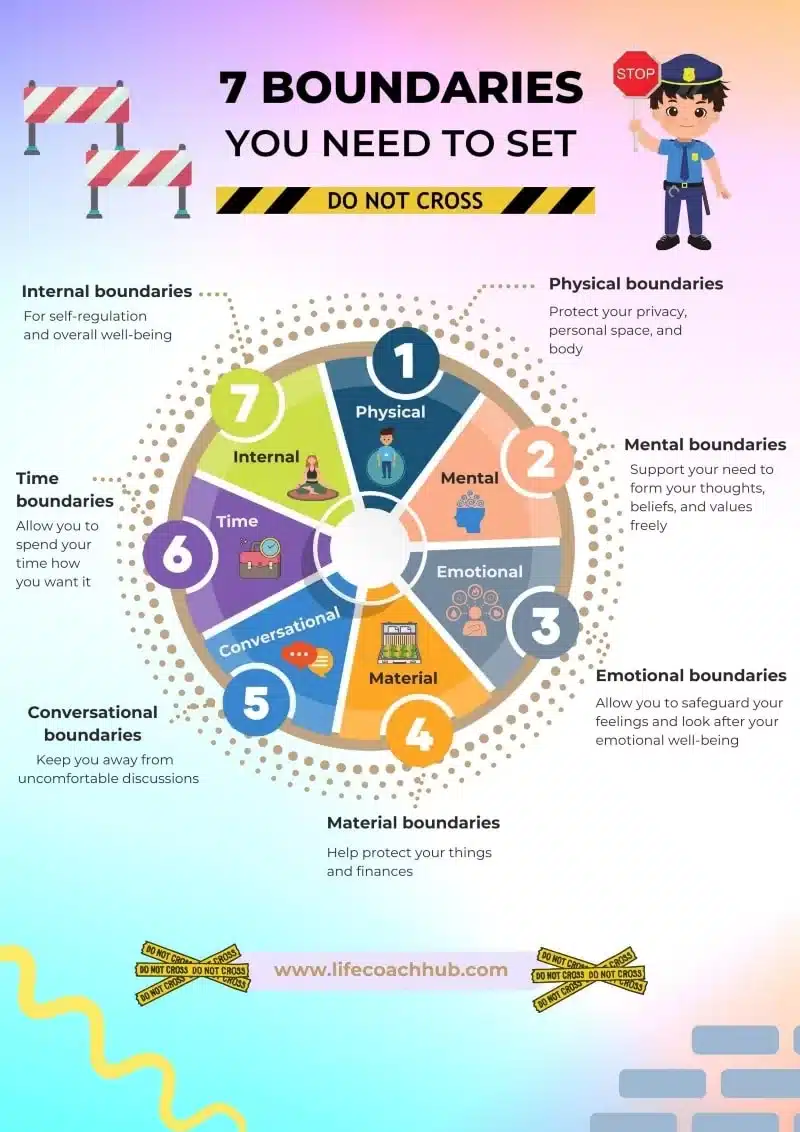
Building a Supportive Network
Understanding of narcissism can help you choose better partners, friends, and colleagues.
A strong support system is vital for a peaceful life.
Look for relationships that are:
- Mutually respectful
- Emotionally fulfilling
- Built on trust and communication
Pro Tip: It’s okay to outgrow relationships that no longer serve you. Letting go can make space for new, healthier connections.
With a strong sense of self, an understanding of societal systems, and healthy relationships, you’re well on your way to achieving a truly peaceful life.
Conclusion: Crafting Your Own Peaceful Life
Living a happy and peaceful life isn’t about chasing perfection or avoiding discomfort—it’s about understanding yourself, navigating the systems around you, and building strong, fulfilling relationships.
By focusing on these three keys, you can create a life that feels authentic, balanced, and meaningful.
Peace isn’t something that just happens; it’s something you create intentionally. Take small, consistent steps, and remember that progress is better than perfection.
You deserve a peaceful life, and with the right mindset and tools, it’s entirely within your reach.

